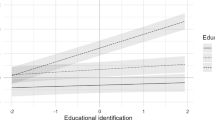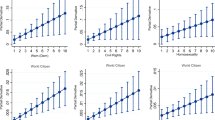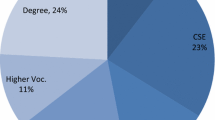Abstract
Focusing on the relationship between education and tolerance toward ethnic out-groups in the Danish public, this analysis presents evidence in support of the argument that an important mechanism behind the positive impact of education on tolerance is cognitive constraint: Academic education promotes the ability to connect ideas, and minds equipped with this ability will tend to generalize the norms of the prevailing democratic culture to include ethnic relations. This tendency is particularly apparent when political orientations of the liberal left are added to common democratic norms. The constrained mind that holds left-leaning political beliefs is compelled to express ethnic tolerance. On the other hand, constrained minds permit themselves to be intolerant only when subscribing to right-wing political ideas explicitly at variance with liberal democratic ideals. Interestingly, cognitive constraint is high also in the minority among people lacking in academic education that scores high on tolerance. Compared to their less tolerant peers, the members of this minority are much more likely to be involved in political organizations, for the most part at the ideological left. This indicates that in Denmark such organizations serve a function that in terms of fostering ability to connect ideas is equivalent to the function of academic institutions.
Similar content being viewed by others
References
Blum, Jacques (1986).Splinten i øjet. Om danskernes forhold til de fremmede. Århus Stavnsager.
Bobo, Lawrence, and Licari, Frederick C. (1989). Education and political tolerance: Testing the effects of cognitive sophistication and target group affect.Public Opinion Quarterly 53: 285–308.
Bonacich, Edna (1972). A theory of ethnic antagonism: The split labor market.American Sociological Review 37: 547–559.
Dahl, Robert A. (1961).Who Governs? Democracy and Power in an American City. New Haven, CT: Yale University Press.
Davis, James A. (1975). Communism, conformity, cohorts and categories: American tolerance in 1954 and 1972–73.American Journal of Sociology 81: 491–513.
Elklit, Jørgen (1984). Det klassiske danske partisystem bliver til. In Jørgen Elklit and Ole Tonsgaard (eds.),Valg og vælgeradfærd. Studier i dansk politik, pp. 21–38. Århus: Politica.
Gibson, James L., and Bingham, Richard D. (1982). On the conceptualization of political tolerance.American Political Science Review 76: 603–620.
Goul Andersen, Jørgen, and Bjørklund, Tor (1990). Structural changes and new cleavages. The progress parties in Denmark and Norway.Acta Sociologica 33: 195–217.
Gundelach, Peter (1992). Danskernes intolerance.Dansk Sociologi 3: 4–22.
Heath, Anthony F., and Topf, Richard G. (1986). Educational expansion and political change in Britain 1964–1983.European Journal of Political Research 14: 543–567.
Hernes, Gudmund, and Knudsen, Knud (1992). Norwegians' attitudes toward new immigrants.Acta Sociologica 35: 123–139.
Hyman, Herbert H., and Wright, Charles R. (1979).Education's Lasting Influence on Values. Chicago: Chicago University Press.
Inglehart, Ronald (1971). The silent revolution in Europe: Intergenerational change in post-industrial societies.American Political Science Review 65: 991–1017.
Inglehart, Ronald (1977).The Silent Revolution: Changing Values and Political Styles Among Western Publics. Princeton, NJ: Princeton University Press.
Inglehart, Ronald (1984). The changing structure of political cleavages in Western society. In Russell J. Dalton, Scott C. Flanagan, and Paul A. Beck (eds.),Electoral Change in Advanced Industrial Democracies, pp. 25–69. Princeton, NJ: Princeton University Press.
Jaakkola, Magdalena (1988). Finländarnas syn på flyktningar. In Gabriele Winai Ström (ed.),Konfliktlösning i det flerkulturella samhället, pp. 53–72. Stockholm: Regeringskanseliets offsetcentral.
Jackman, Mary R., and Muha, Michael J. (1984). Education and intergroup attitudes: Moral enlightenment, superficial democratic commitment, or ideological refinement?American Sociological Review 49: 751–769.
Jensen Ulla Skovgaard, and Poulsen, Jørgen (1990). Solidaritetens former.Politica 22: 282–305.
Jenssen, Anders Todal (1994). The rise of racism and the Norwegian right. In Kenneth Nyström (ed.),Encounter with Strangers. The Nordic Experience, pp. 29–54. Lund: Lund University.
Jenssen, Anders Todal, and Engesbak, Heidi (1994). The many faces of education. Why are people with lower education more hostile towards immigrants than people with higher education?Scandinavian Journal of Educational Research 38: 33–60.
Knutsen, Oddbjørn (1990a). Materialist and postmaterialist values and social structure in the Nordic countries.Comparative Politics 23: 85–104.
Knutsen, Oddbjørn (1990b). The materialist/post-materialist value dimension as a party cleavage in the Nordic countries.West European Politics 13: 258–274.
Körmendi, Eszter (1986).Os og de andre. Danskernes holdninger til indvandrere og flygtninge. Copenhagen: Socialforskningsinstituttets publikation no. 153.
Lange, Anders, and Westin, Charles (1993).Den mångtydiga toleransen. Förhållningssätt till invandring och invandrare 1993. Centrum för invandringsforskning, Stockholm University.
LeVine, Robert A., and Campbell, Donald T. (1972).Ethnocentrism: Theories of Conflict, Ethnic Attitudes, and Group Behavior. New York: John Wiley & Sons.
Lipset, Seymour Martin (1960).Political Man. Garden City, NJ: Anchor Books.
Lipset, Seymour Martin (1981).Political Man, 2nd edition. Baltimore: Johns Hopkins University Press.
Lipset, Seymour Martin, and Rokkan, Stein (1967).Party Systems and Voter Alignments: Cross-National Perspectives. New York: Free Press.
McClosky, Herbert (1964). Consensus and ideology in American politics.American Political Science Review 58: 361–382.
Mokken, Robert J. (1971).A Theory and Procedure of Scale Analysis. The Hague and Paris: Mouton.
Nannestad, Peter (1989).Reactive Voting in Danish General Elections 1971–1979. A Revisionist Interpretation. Århus: Århus University Press.
Nie, Norman H., Verba, Sidney, and Petrocik, John R. (1979).The Changing American Voter. Cambridge, MA: Harvard University Press.
Nunn, Clyde Z., Crockett, Harry J., and Williams, Allen J. (1978).Tolerance for Nonconformity. San Francisco: Jossey-Bass.
Prothro, James W., and Grigg, Charles M. (1960). Fundamental principles of democracy: Bases of agreement and disagreement.The Journal of Politics 22: 276–294.
Quinley, Harold E., and Glock, Charles Y. (1979).Anti-Semitism in America. New York: Free Press.
Rokkan, Stein, and Campbell, Angus (1960). Citizen participation in political life: Norway and the United States of America.International Social Science Journal 12: 69–99.
Selznick, Gertrude J., and Steinberg, Stephen (1969).The Tenacity of Prejudice: Anti-Semitism in Contemporary America. New York: Harper Torchbook.
Sniderman, Paul M., Brody, Richard A., and Kuklinski, James H. (1984). Policy reasoning and political values: The problem of racial equality.American Journal of Political Science 28: 75–94.
Sniderman, Paul M., Piazza, Thomas, Tetlock, Philip E., and Kendrick, Ann (1991). The new racism.American Journal of Political Science 35: 423–447.
Stouffer, Samuel A. (1955).Communism, Conformity and Civil Liberties. Garden City, NJ: Doubleday.
Sullivan, John L., Pierson, James, and Marcus, George E. (1982).Political Tolerance and American Democracy. Chicago: The University of Chicago Press.
Togeby, Lise (1992). The nature of declining party membership in Denmark. Causes and consequences.Scandinavian Political Studies 15: 1–19.
Weil, Frederick D. (1985). The variable effect of education on liberal attitudes: A comparative-historical analysis of anti-Semitism using public opinion survey data.American Sociological Review 50: 458–474.
Yinger, Milton J. (1983). Ethnicity and political change: The interactions of structural, cultural and personality factors.Ethnic and Racial Studies 6: 395–409.
Zipp, John F. (1986). Social class and social liberaism.Sociological Forum 1: 301–329.
Author information
Authors and Affiliations
Rights and permissions
About this article
Cite this article
Gaasholt, Ø., Togeby, L. Interethnic tolerance, education, and political orientation: Evidence from Denmark. Polit Behav 17, 265–285 (1995). https://doi.org/10.1007/BF01498597
Issue Date:
DOI: https://doi.org/10.1007/BF01498597




